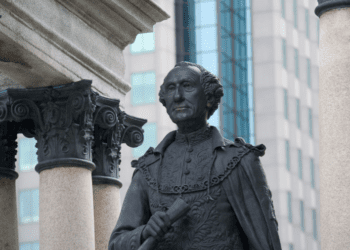![]() Sir John A. Macdonald’s opening speech in the Confederation Debates, leading off the government case for Confederation, asks the House to approve a Union of the provinces based on the Quebec Resolutions agreed in October 1864. Macdonald explains his late conversion to the cause of federation, and outlines the advantages of Canada’s new federal constitution.
Sir John A. Macdonald’s opening speech in the Confederation Debates, leading off the government case for Confederation, asks the House to approve a Union of the provinces based on the Quebec Resolutions agreed in October 1864. Macdonald explains his late conversion to the cause of federation, and outlines the advantages of Canada’s new federal constitution.
For years Macdonald had resisted Brown’s calls for constitutional change, favouring an incrementalist approach waiting for “ripeness” of the question and the prospect of cross-party agreement. Recently the constitutional issue had taken on new dimensions, Macdonald outlines, when disagreement over rep by pop had threatened the Union, and Canada had become increasingly ungovernable. “Such was the danger of impending anarchy,” he declares, “…that unless some solution of the difficulty was arrived at we would suffer under a succession of weak governments—weak in numerical support, weak in force, and weak in power of doing good.”
Macdonald explains his last-minute conversion to the cause of federation, in terms that suggest the preoccupations of a man likely to play a leadership role in the new national government. A dedicated unionist, Macdonald was wary of the states rights controversy which had contributed to the US Civil War. Although a legislative union would have been stronger, and cheaper and better, French-Canadians would never have consented to it, Macdonald declares. A unitary state might have its advantages, but it was simply “impracticable.”
Although a federation by necessity, Canada must have a strong central government, Macdonald continues, contrasting the proposed division of powers with that in the United States, then in the grip of a terrible civil war. Each American state was sovereign, arrogating to itself all sovereignty not expressly delegated to the federal government. But in Canada all matters of general concern would be given to the federal government in its enumerated powers, with a residual power to upstream other matters of general interest not specifically given to the provinces. In this way, Canada would “strengthen the Central Parliament, and make the Confederation one people and one government, instead of five peoples and five governments, with merely a point of authority connecting us to a limited and insufficient extent.”
Yet Macdonald’s centralist views should not be overstated, and his argument is overall that of a convinced federalist, even if one won over more by the forces of practical politics than its theoretical appeal. Macdonald speaks of having found the “happy medium,” securing “all the advantages of a legislative union under one administration, with, at the same time the guarantees for local institutions and for local laws, which are insisted upon by so many.”
Shifting to the substantive merits of the new constitution, Macdonald speaks of the advantages of parliamentary government, and its ability to secure constitutional liberty better than a presidential system. An American President was “a despot, a one-man power,” and “perfectly uncontrolled by responsible advisers, his cabinet being departmental officers merely.” In Canada we would have a head of state above politics, and an executive acting only on the advice of ministers responsible to parliament, able to be voted out on a moment’s notice on the loss of any confidence vote.
With Canada a mere geographical expression, perhaps Macdonald’s chief contribution was to sound a powerful note of unity–a declaration that hereafter Canadians should form and be one people. Macdonald’s speech had to answer the Canadian question, whether Canada would be a country at all. To this Macdonald gave his answer—we will be one people, we will be united, and we will be free.
The following is an extract. Sir John A. Macdonald’s full Speech in the Confederation Debates can be downloaded here.
ATTORNEY GENERAL MACDONALD moved,
“That an humble Address be presented to Her Majesty, praying that She may be graciously pleased to cause a measure to be submitted to the Imperial Parliament, for the purpose of uniting the Colonies of Canada, Nova Scotia, New Brunswick, Newfoundland, and Prince Edward Island, in one Government, with provisions based on certain Resolutions, which were adopted at a Conference of Delegates from the said Colonies, held at the city of Quebec, on the 10th October, 1864.”
I have had the honor of being charged, on behalf of the Government, to submit a scheme for the Confederation of all the British North American Provinces.
He said:—Mr. Speaker, in fulfilment of the promise made by the Government to Parliament at its last session, I have moved this resolution. I have had the honor of being charged, on behalf of the Government, to submit a scheme for the Confederation of all the British North American Provinces—a scheme which has been received. I am glad to say, with general, if not universal, approbation in Canada. The scheme, as propounded through the press, has received almost no opposition. While there may be occasionally, here and there, expressions of dissent from some of the details, yet the scheme as a whole has met with almost universal approval, and the Government has the greatest satisfaction in presenting it to this House.
This subject, which now absorbs the attention of the people of Canada, and of the whole of British North America, is not a new one. For years it has more or less attracted the attention of every statesman and politician in these provinces, and has been looked upon by many far-seeing politicians as being eventually the means of deciding and settling very many of the vexed questions which have retarded the prosperity of the colonies as a whole, and particularly the prosperity of Canada.
The subject was pressed upon the public attention by a great many writers and politicians; but I believe the attention of the Legislature was first formally called to it by my honorable friend the Minister of Finance. Some years ago, in an elaborate speech, my hon. friend, while an independent member of Parliament, before being connected with any Government, pressed his views on the Legislature at great length and with his usual force. But the subject was not taken up by any party as a branch of their policy, until the formation of the CARTIER-MACDONALD Administration in 1858, when the Confederation of the colonies was announced as one of the measures which they pledged themselves to attempt, if possible, to bring to a satisfactory conclusion.
In pursuance of that promise, the letter or despatch, which has been so much and so freely commented upon in the press and in this House, was addressed by three of the members of that Administration to the Colonial Office.
Sir John A. Macdonald’s full Speech in the Confederation Debates can be downloaded here.




